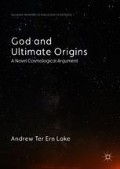Abstract
A First Cause which is uncaused, beginningless, and a libertarian agent has all the essential properties of being a Personal Creator of the universe. The conclusion that such a Creator exists is not based on ignorance, but on reasons explained in previous chapters. While the progress of science would generate further scientific explanations for physical reality, it would not replace the need for such a First Cause to explain the existence of physical reality itself. Moreover, since metaphysical considerations are more fundamental than mathematical considerations as explained previously, the metaphysical arguments offered in previous chapters would imply that cosmological models inconsistent with the conclusions of this book are impossible, regardless of whether they are mathematically possible. I end this book by reflecting on the significance of these conclusions.
References
Craig, William Lane, and James Sinclair. 2009. The Kalam Cosmological Argument. In The Blackwell Companion to Natural Theology, ed. William Lane Craig, and J.P. Moreland. Chichester: Wiley-Blackwell.
Craig, William Lane. 2010. The New Atheism and Five Arguments for God. http://www.reasonablefaith.org/the-new-atheism-and-five-arguments-for-god. Accessed 21 Jan 2017.
Dawkins, Richard. 2006. The God Delusion. London: Bantam Press.
Einstein‚ Albert. 1987. Letters to Solovine‚ translated by Wade Baskin‚ with an introduction by Maurice Solovine. New York: Philosophical Library.
Krauss, Lawrence. 2012. A Universe from Nothing: Why There is Something Rather than Nothing. New York: Free Press.
Lewis, Geraint, and Luke A. Barnes. 2016. A Fortunate Universe: Life in a Finely Tuned Cosmos. Cambridge: Cambridge University Press.
Loke‚ Andrew. 2017. The Origins of Divine Christology. Society for New Testament Studies Monograph Series. Cambridge: Cambridge University Press.
Moreland, J.P., and William Lane Craig. 2003. Philosophical Foundations for a Christian Worldview. Downers Grove: InterVarsity Press.
Sidelle, Alan. 2002. On the Metaphysical Contingency of Laws of Nature. In Conceivability and Possibility, ed. Tamar Gendler, and John Hawthorne. Oxford: Oxford University Press.
Author information
Authors and Affiliations
Corresponding author
Rights and permissions
Copyright information
© 2017 The Author(s)
About this chapter
Cite this chapter
Loke, A.T.E. (2017). The Conclusion of Our Quest. In: God and Ultimate Origins. Palgrave Frontiers in Philosophy of Religion. Palgrave Macmillan, Cham. https://doi.org/10.1007/978-3-319-57547-6_7
Download citation
DOI: https://doi.org/10.1007/978-3-319-57547-6_7
Published:
Publisher Name: Palgrave Macmillan, Cham
Print ISBN: 978-3-319-57546-9
Online ISBN: 978-3-319-57547-6
eBook Packages: Religion and PhilosophyPhilosophy and Religion (R0)

